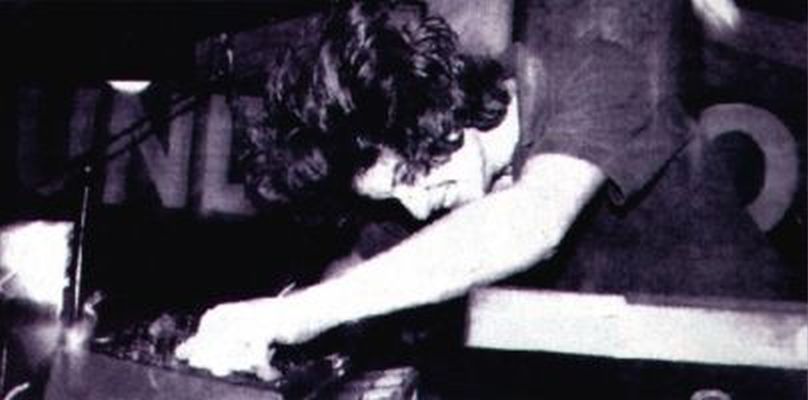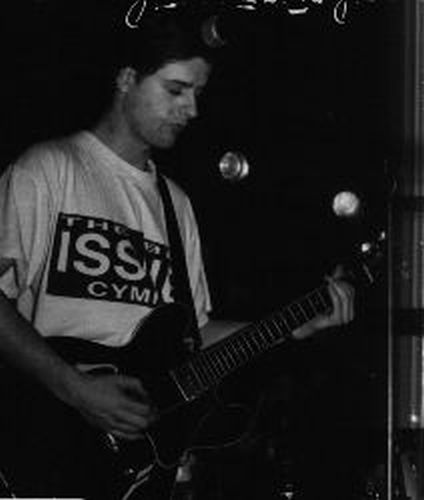Interview in Sessions Magazine April 1997
"What do you mean? This is an Irish Pub!"
Well, yes, the signs outside gave it away, but maybe on
reflection this was not such a good idea.
Well, we can try somewhere else.
"Don't worry. Come back. You're all right."
Jonathon Wright talks to the band unlike any other...

The
scene is Oxford. It is a sunny morning and somehow, of all the
bands this could possibly have happened to, it is somehow fitting
that it should be Gorky's Zygotic Mynci who have just nearly been
thrown out of a pub for having the temerity not to order beer.
Gorky's, in case you have not heard yet, are not quite like other
bands. Other bands, for instance, take lots of drugs, talk
complete bollocks, smash up hotel rooms and absolutely hate each
other. Other bands most definitely do not order non-alcoholic
beverages in Celtic drinking establishments on the grounds that it
looks like you can sit next to the canal here.
In their defence. It has not even reached midday yet and Gorky's
may well give their leisure time over to the above pursuits.
But, then again, who wants Gorky's to be like other bands anyway?
Because, while other bands spend their time retreading the same
old influences, Gorky's are a weird and wonderful pop thrill who
have made a virtue out of being brilliantly different from
virtually any other group you could mention.

Formed in 1990 in Pembrokeshire, Wales by Euros Childs (vocals and
keyboards), Richard James (bass) and John Lawrence (guitar) when
the trio were all still at school, Gorky's had expanded to include
Euros' sister Megan (violin and, on the evidence of the way she
can brandish a notebook and tell the rest of the band what to do,
organising things), and Euros Rowlands (drums) by the time they
released their debut single 'Patio' in 1992.
Although the single picked up some attention, it was the band's
1994 debut album 'Tatay' ,released via the independent Welsh label
Ankst, which really began to get Gorky's serious public attention.
Not only did the album feature some lyrics sung in Welsh, it also
musically name-checked Robert Wyatt and Kevin Ayers, both
stalwarts of the British 60s psychedelic scene.
If that had some cynics convinced the band were definitely very
peculiar and quite possibly, errm, not very dangerous at all, the
band's second album 'Bywd Time' (1995) sealed things. The cover
featured a photo of the band dressed up as in wizard costumes
while sitting underneath a tree.
The hippy alert would now most definitely have been out, except
for one thing, Gorky's sounded brilliant: a dizzying collision of
Captain Beefheart, The Beach Boys, British psychedelia and The
Fall linked to a knack for writing great pop melodies.
Things then took an even more bizarre turn. Obviously, a band this
weirdly British was never going to get signed by an American
label, was it? Things being what they are in the Gorky's world the
band were picked up by Mercury USA. Thus, by a very roundabout
route, the band's new album 'Barafundle', will be released in the
UK by Mercury offshoot Fontana.
And a superb album it is, the sound of a band have grown up open
to all forms of music and raided what they need to produce a
unique hybrid which is whimsical, playful, folky, (so what? Want
to make an issue of it?), and quite unlike virtually other band in
the world.
But, then again, who wants Gorky's to be like any other bands
anyway? Thus, we join them sitting outside an Irish pub drinking
coffee and being (phew) very un-rock 'n' roll.

Q&A
Sessions: Barafundle will be released via
Fontana. What's the difference between being on an independent
label and a major?
Megan: It's more complicated in a way. There's so
many more people to deal with. It's not just going down to Ankst
and there's three people there and they're all there together in
one room.
Euros C.: You go in and they won't know your
single from another. They don't know who you are. They don't care,
either. But, fair enough, they've got a job to do.
John: The resources are very different. If you
release something, you know you can have hundreds of posters in
every city to advertise it.
Euros C.: It's nice knowing people can go into
HMV or Our Price and the record's going to be there. We always had
people saying they couldn't get hold of our records.
Sessions: You were brought up (and still live) in
Pembrokeshire. Do you think that changes your approach to your
work?
Richard: I was reading about Kraftwerk the other
day and they were going on about how they were brought up in an
industrial area. So, it was natural for them to do that music.
Just as it's natural for us to do what we do. The reason different
music is going on is because people are in different environments.
Which is a healthy thing really.
Megan: When you think about punk, you associate
that with cities. There's something really quite strange about
people from small towns or villages being in a punk band Its
detached isn t it? Its more about what music is in the media eye
or magazines rather than what it is to you.
Sessions: How would you describe your music?
John: Indescribable.
Euros C.: We don't know ourselves. We haven't
locked into one sound or one style so it's hard for us to pin it.
Richard: Inspired pop. (Greeted by Iaughter)
Errm, maybe.
John: Take two different songs of ours and they
could be by very different bands.
Sessions: Do you feel any particular kinship with
other Welsh bands?
Euros C.: Not really. We enjoy what music we
enjoy, wherever it comes from.
Megan: You're probably more aware of other Welsh
bands, but you listen to the actual music the same way you would
listen to anything.
Richard: Before the Super Furry's were the Super
Furry's, two members were in another Welsh band. But, because they
sang all in Welsh, they never got any attention anywhere. I
thought they were a really good band.
Sessions: It seems a little ridiculous that you
have to sing in English.
Euros C.: Yeah, but it's natural for us to sing
in English. We started singing in English and then switched to
Welsh. But, musically we haven't compromised and if we hadn't
wanted to sing in English, we wouldn't have sung in English. It
happens to be that we like writing in English as well. It's lucky
really.
Sessions: You've said you admire Richard
Thompson. There's a big British folk tradition which you seem to
draw on which often seems to get more name-checked by American
hands like REM. Here, Thompson almost seems to get written out of
musical history.
Richard: There's almost some embarrassment
attached to folk music, perhaps
Euros C.: Yeah, it's sad that Because it's
denying what is something to draw on, something to be proud
of. The folk songs you hear bands did, it's a shame people don't
do them any more. Perhaps, they feel it's dated or whatever. I
don't know. Maybe we should do a traditional album. (At this
point, Euros is interrupted by a few giggles.) No, it would be
good that. We've done a song that was written a couple of hundred
years ago, and it could be a pop song. When you apply that style
to it, you can do anything with any song.
Sessions: You seem very open to music. Was this
anything to do with forming very young and not having time to read
the music papers or get cynical?
John: I'm cynical about a lot of shit!
Richard: We always did read the music papers in
school, but we never felt pressurised into believing we had to
believe what they say.
Euros C.: When we would do music at the start, we
were totally detached. We thought. Not that we're not good enough,
but that because of where we're from, we stand no chance of
getting a record in the charts. We've got no chance of getting on
the radio. We weren't being defeatist We thought we were being
realistic. So, perhaps what we listened to then doesn't sound like
what your average 15-year-old listens to.
Richard: That was probably an important part of where we live and
how it affected us in that way.
Sessions: You have been touring a lot recently.
How's that been going?
Euros C.: Every time it changes for us. It's a
natural progression really. We're playing to about double the
audiences we played to last year.
John: Yeah, because we do our best to make our
music as available as possible.
Euros C.: Yeah, we sell t-shirts on tour and,
when we have a bad night on stage, we sell about half the number
of t-shirts. People do know a bad gig or a bad record when they
hear it People aren't stupid.
Richard: You can't treat people as marketing
possibilities.
Why, not? To be really cynical, plenty of other bands do. But
then, as they troop into the afternoon sun, killing time and
listening to Megan's instructions about when to meet at the cIub
suddenly strikes you again. Gorky's are not like other bands.
 The
scene is Oxford. It is a sunny morning and somehow, of all the
bands this could possibly have happened to, it is somehow fitting
that it should be Gorky's Zygotic Mynci who have just nearly been
thrown out of a pub for having the temerity not to order beer.
The
scene is Oxford. It is a sunny morning and somehow, of all the
bands this could possibly have happened to, it is somehow fitting
that it should be Gorky's Zygotic Mynci who have just nearly been
thrown out of a pub for having the temerity not to order beer.
